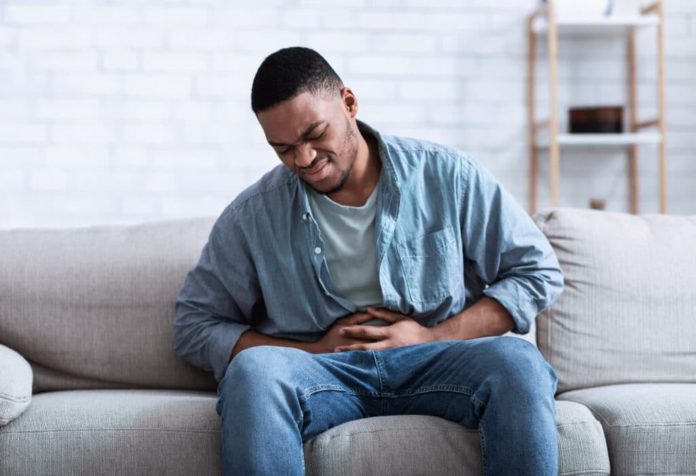
Shigella cases are on the rise among queer men – here’s what to do. (Stock photograph via Event Elements)
Here’s a quick guide to what you need to know about the STI you’ve never heard of… and how to deal with it.
Shigella, a bacterium that causes dysentery, is a serious gut infection that can cause severe and long-lasting diarrhoea and stomach cramps. It’s typically transmitted through the accidental ingestion of faecal matter containing the bacteria, such as through oral sex.
British health experts have warned for years that Shigella caseloads are on the rise – so there are five things to know about Shigella, including how to treat it.
1. You might mistake it for food poisoning
Shigella causes severe diarrhoea, stomach cramps and fever, so is often mistaken for food poisoning.
With less travel overseas in the last 18 months, England is seeing more Shigella cases caught via sex.
“After talking with the health worker, we realised it was unlikely to be the egg sandwich and more likely the guys I’d had sex with at a weekend house party,” said one man recently diagnosed.
“Thankfully my GP suggested I give a sample. He gave me the correct antibiotics and I was able to leave the toilet after a week.
“It took me another two weeks after that to feel well enough to go back to work.”
2. Gay and bisexual men are at risk – especially in London, Manchester and the South East
“New figures show increases in Shigella this year that we believe is due to sexual transmission between men,” says Dr Michael Brady, Medical Director at Terrence Higgins Trust.
“As a community, gay and bi men need to know about this infection, how to treat it and how to look after ourselves and our partners.”
In England, there was over five times the number of adult male cases of Shigella without a known association with foreign travel compared to female cases in 2020.
3 . It’s easy to catch and makes you very unwell
“Shigella is caught from bacteria found in faeces,” explains Public Health England’s Helen Corkin.
“Only a tiny amount in contact with your mouth, via rimming or fingering, for example, can make you very unwell after sex.
“Typically, the symptoms are seen between 1- 4 days later.
“One of the men I spoke to said he felt like a zombie and the other felt like he was dying and was hospitalised for a week with complications from Shigella and dehydration.”
You can get Shigella by licking skin, condoms, toys, fingers or surfaces which may have tiny amounts of faeces on it – e.g. when rimming, fisting, or giving oral sex after anal sex.
4. Treating Shigella
It’s not all bad news – a Shigella infection is treatable.
Keep hydrated and rest – sometimes it may go away by itself but if you don’t feel well within 48 hours or feel worse, seek medical treatment.
Call or visit your GP or a sexual health clinic to get tested. Explain that your symptoms match Shigella and that you’ve had sex.
The doctor needs to know this so you get the right tests (a stool sample usually) and the correct antibiotics.
A full sexual health check-up including an HIV test is a good idea. Don’t have sex until seven days after your last symptom.
5. How do I keep myself and my partners safe from Shigella?
Practice good hygiene and wash your hands with soap after sex, handling used condoms or toys, and going to the toilet.
Change condoms between anal and oral sex and use latex gloves for fingering or fisting.
Some people carry Shigella without any of the symptoms, some have mild symptoms and some people get very unwell and are hospitalised.
“The main thing for gay and bi men is to be aware of Shigella and not dismiss the symptoms,” says Taku Mukiwa from Terrence Higgins Trust.
“Take a break, give yourself time to recover. Don’t have sex until seven days after your last symptom and avoid sex, spas, swimming, hot tubs and sharing towels as well as preparing food for other people until a week after symptoms stop.”
You can find out more information about Shigella and get advice on other topics at sexwise.org.uk/shigella or by calling the free National Sexual Health Helpline at 0300 123 7123.








